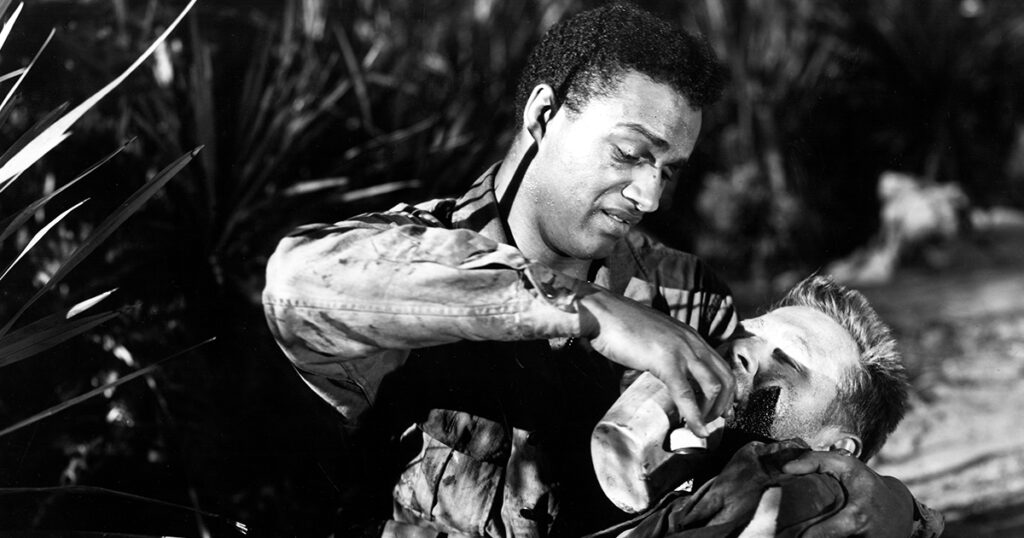
Much of my early education in film history I owe to the old Million Dollar Movie on television (WOR-TV Channel 9 in the New York metropolitan area), which showed the same movie back-to-back every night for a week, with Max Steiner’s theme from Gone with the Wind to usher you in and out. As a boy, I watched the 1949 war film Home of the Brave on successive nights, deeply moved by this so-called “problem picture,” which Ralph Ellison praised for hitting the “deep center of American emotion.” It was, Ellison wrote, “a look at the ties between the races and also the deep-seated nests of American racism itself.” It “set up a confrontation. One is forced to deal with racial issues.”
Directed by Mark Robson, Home of the Brave is first and foremost a sensitive treatment of racism, but it is also sophisticated in its handling of the subjects of courage, cowardice, and survivor’s guilt. It was filmed independently on a small budget. Carl Foreman and Arthur Laurents wrote the screenplay; Stanley Kramer produced; Dmitri Tiomkin contributed the music, and the last lines of Eve Merriam’s poem “The Coward” mark the movie’s moral climax.
The film depicts a company of U.S. soldiers entrusted with a dangerous mission on an island in the Pacific that the Japanese tenaciously hold. The men—Major Robinson (Douglas Dick), Sergeant Mingo (Frank Lovejoy), Corporal Everett, a bigoted redneck (Steve Brodie), and privates Finch (Lloyd Bridges) and Moss (James Edwards) —are asked to make an amphibious landing and to map the terrain in advance of an invasion.
Moss is a late addition to the company, and Finch is enthusiastic about having him on board. The two are old friends. They played high school basketball player together. But not everyone in the company likes having Moss as a comrade, because he is Black. The movie is, in fact, anachronistic, because the U. S. Army was not integrated until President Truman issued a directive in 1948, three years after World War II came to an end.=
Home of the Brave was based on Laurents’s Broadway play of the same title, in which a Jewish G.I. is subjected to anti-Semitic abuse, and one thing that fascinates me about the movie is the way it extends the tradition of treating African Americans and Jews as allegorical representations of each other. The spiritual “Go Down, Moses” is one example. While the Jewish authorship of songs sung definitively, though not exclusively, by African-American singers (George Gershwin’s “Summertime,” Jerome Kern’s “Ol’ Man River”) implies an affinity between the two groups, it also yields a certain amount of more or less creative tension, and the more complicated feelings that inevitably attend such a relation.
In Home of the Brave, Finch is Moss’s great defender until, in a moment of panic, he angrily calls his old buddy a “nitwit,” pausing long enough between the “ni-” and the “-twit” to leave the impression that he was going to reveal, in the one word, the racism that survived the appearance of friendship. When Finch is killed by the Japanese, Moss feels glad for a split second, relieved that it wasn’t he who took the bullet. As a result, he is paralyzed, not with fear but with guilt. Though unbloodied, he cannot move. Another man has to carry Moss to the boat when, under fire, they make their escape from the island.
Back at the base, Moss is confined to his bed. There is nothing physically wrong with him, but he cannot walk. Having coaxed Moss’s story out of him in a series of flashbacks, the doctor (Jeff Corey) explains that every soldier feels glad, if only for a split second, when it is the guy beside him who loses his life to a bullet or a grenade. The reaction is normal, as is the ensuing guilt that preys on the survivor. Moss wants to believe but is still unable to move. Having exhausted all other means of curing his patient, the doc uses a charged racial epithet to impel Moss to “get up and walk.” The gambit works. Moss inches his way to the doctor and hugs him in relief.
Cured of his paralysis, Moss remains guilt-ridden until he has a heart-to-heart with Mingo, the tough-as-nails sergeant who “lost a wing” on the mission. Mingo recounts the instant of gladness that he felt when a buddy beside him was shot in an earlier action. And it is Mingo, arm in a sling, who recites the last lines of “The Coward,” which he attributes to his wife:
Only two, and yet our howling can
Encircle the world’s end.
Frightened, you are my only friend.
And frightened, we are everyone.
Someone must make a stand.
Coward, take my coward’s hand.
The lines—from Eve Merriam’s Family Circle (1946), which Archibald MacLeish chose for the Yale Younger Poets Series—are meant to embolden the listener by extending a hand. They do more than that; they give the moment a majesty that it would not otherwise have.
All in the cast deserve accolades. James Edwards, a first lieutenant in the army in World War II, gives an outstanding performance as Private Moss. Movie buffs will recognize Steve Brodie as Robert Mitchum’s ill-fated partner in Out of the Past (1949). In The Hitch-Hiker (1953), one of director Ida Lupino’s best films, Frank Lovejoy is a guy on a fishing trip whose car gets commandeered by a homicidal maniac. Lloyd Bridges, father of Jeff and Beau, played the psychopath who leads Lovejoy astray in the underrated noir The Sound of Fury(1950).
Above all, the scenes between Jeff Corey and James Edwards still pack a punch. Emily Corey, Jeff Corey’s daughter, remembers “African-American men of all ages stopping my father on the street and saying, ‘Doc, I just want to shake your hand.’”

